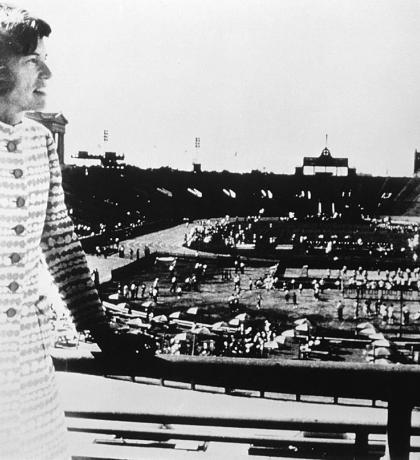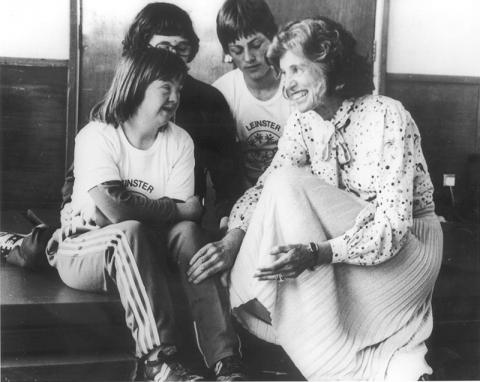
As we celebrate the 50th anniversary of Special Olympics this year, we are taking a look back at the #50moments that have defined the Special Olympics movement here in B.C. and throughout the world.
Eunice Kennedy Shriver believed in justice. But, in the late 1950s and early 1960s, she saw little justice in the way people with intellectual disabilities were treated. She saw they were excluded and routinely placed in custodial institutions. They were often ignored and neglected, yet she knew they had many talents and gifts to offer.
Eunice Kennedy Shriver had a sister, Rosemary, who had an intellectual disability. She and Rosemary grew up playing sports together and with their family. The sisters swam, they sailed, they skiied, they played football together. But in those days, there were limited programs and options for Rosemary.
Eunice Kennedy Shriver went on to become an athlete in college. She began to see that sports could be a common ground to unite people from all walks of life.
Eunice Kennedy Shriver believed that if people with intellectual disabilities were given the same opportunities and experiences as everyone else, they could accomplish far more than anyone ever thought possible. She put that vision into action in 1962 by inviting young people with intellectual disabilities to a summer day camp she hosted in her backyard. She called it "Camp Shriver." The goal was to explore the children's skills in a variety of sports and physical activities. The idea behind that first Camp Shriver began to grow. In July 1968, the first International Special Olympics Games were held in Chicago, Illinois, USA.
In her remarks at the Opening Ceremony, she said the inaugural Chicago Special Olympics prove "a very fundamental fact” – that children with intellectual disabilities can be exceptional athletes and that "through sports they can realize their potential for growth.” She pledged that this new organization, Special Olympics, would offer people with intellectual disabilities everywhere “the chance to play, the chance to compete and the chance to grow.”
What began as one woman's vision evolved into Special Olympics International – a global movement that today serves more than 4.7 million people with intellectual disabilities in 170 countries.
Recognized throughout the world for her efforts on behalf of persons with intellectual disabilities, Eunice Kennedy Shriver also received many honours and awards. These include the U.S. Presidential Medal of Freedom, the highest honour awarded to civilians in the U.S., and honourary degrees from Yale University and Princeton University, among others. Yet, she always felt that it was people with intellectual disabilities who deserved the awards.
She continued to be a champion of Special Olympics until her death on August 11, 2009. Her husband, Sargent Shriver, also instrumental in the Special Olympics movement, died January 18, 2011. Tim Shriver continues his mothers work, serving as the Chairman of Special Olympics International. He continues to lead by the incredible example his mother laid before him.
Today, her legacy can be seen on the faces of the more than 4.7 million Special Olympics athletes that span more than 170 countries. In British Columbia, every smile is a testament to her commitment to improving the lives of the 4,800 athletes in 55 around the province. It’s evident in every high-five, and word of encouragement echoed by the 3,900 trained, dedicated coaches and volunteers in B.C.
Because of Mrs. Shriver, Special Olympics athletes experience joy and acceptance, cultivate friendships and self-confidence, and feel empowered to overcome obstacles and achieve their goals.

